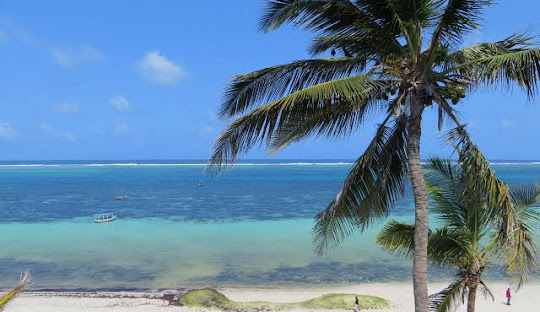Mombasa, Kenya
🏖️ Top Attractions in Mombasa
1. Fort Jesus: A UNESCO World Heritage site, this 16th-century fort offers insights into Mombasa's colonial past.
2. Old Town: Wander through narrow alleys lined with Swahili, Arab, and Portuguese architecture, bustling markets, and traditional eateries.
3. Mombasa Marine National Park: Ideal for snorkeling and diving, this park showcases vibrant coral reefs and diverse marine life.
4. Haller Park: A transformed quarry turned ecological haven, home to giraffes, hippos, and a variety of bird species.
5. Nyali Beach: A popular spot for relaxation, water sports, and enjoying the coastal ambiance.
🍽️ Culinary Delights
Mombasa's cuisine is a flavorful fusion of African, Arab, and Indian influences. Must-try dishes include:
-
Pilau: Spiced rice dish often served with meat or vegetables.
-
Biryani: A rich, aromatic rice dish with layers of meat or seafood.
-
Samaki wa Kupaka: Grilled fish in coconut sauce.
-
Viazi Karai: Deep-fried potatoes coated in a spicy batter.
Local eateries and street vendors offer authentic tastes that reflect the city's diverse heritage.
🛍️ Shopping & Souvenirs
Explore markets like Marikiti and Biashara Street for handcrafted items, including:
-
Kikoy and Kitenge fabrics: Colorful textiles perfect for clothing or home decor.
-
Wood carvings: Intricate sculptures and masks representing local art.
-
Beaded jewelry: Handmade accessories showcasing Maasai craftsmanship.
🏨 Accommodation Options
-
Luxury: Serena Beach Resort & Spa—Offers beachfront views and Swahili-inspired architecture.
-
Mid-Range: Voyager Beach Resort—Family-friendly with themed entertainment.
-
Budget: New Palm Tree Hotel—Centrally located with essential amenities.
📅 Best Time to Visit
The optimal period to explore Mombasa is during the dry seasons:
-
January to March: Warm temperatures and clear skies.
-
July to October: Cooler climate, ideal for beach activities and wildlife viewing.
🚗 Getting Around
-
Taxis and Ride-Hailing: Services like Uber and Bolt are available.
-
Matatus: Shared minibuses offering affordable transport.
-
Tuk-tuks: Three-wheeled vehicles suitable for short distances.
📝 Travel Tips
-
Currency: Kenyan Shilling (KES).
-
Language: Swahili and English are widely spoken.
-
Safety: Exercise usual precautions; avoid isolated areas after dark.
-
Health: Stay hydrated and use mosquito repellent to prevent malaria.


